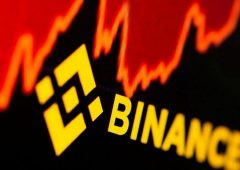Lower Ethereum Gas Fees – A Catalyst for Recovery or a Warning Sign?
19.02.2025 13:00 1 min. read Alexander Zdravkov
Ethereum transaction fees have plummeted to just $0.41, marking their lowest point in four years.
While some see this as a positive development, others are questioning its implications for ETH’s price trajectory, especially after recent selling pressure.

Analyst Miles Deutscher pointed out that fees once soared as high as $15.21 just two years ago, with recent network upgrades like Dencun playing a major role in reducing costs.
However, as rival blockchains offer faster and cheaper alternatives, Ethereum’s dominance in DeFi and NFTs has been challenged. Some believe new trends, such as real-world asset tokenization and blockchain-based finance, could renew interest in ETH.
Lower fees also signal a drop in network congestion, according to analytics firm Santiment. While this could indicate reduced activity, past trends suggest it may eventually attract more users back to the ecosystem.
Meanwhile, Ethereum’s price has struggled to maintain key support levels, with analyst Ali Martinez noting a shift toward bearish momentum. Adding to concerns, blockchain tracker SpotOnChain revealed that a whale offloaded 23,330 ETH—worth around $61.9 million—on Binance, hinting at potential further downside.
-
1
Ethereum nears key resistance as analysts predict $3,500 surge
13.07.2025 20:00 2 min. read -
2
Here is Why Institutions are Choosing Ethereum, According To Vitalik Buterin
06.07.2025 15:00 1 min. read -
3
Top 10 Institutional ETH Holders
10.07.2025 17:00 2 min. read -
4
Altcoins Gain Momentum as Bitcoin Dominance Drops to 61.6%
17.07.2025 15:30 2 min. read -
5
Ethereum Surges Above $3,420 While XRP Stays Stable Over $3
17.07.2025 10:39 1 min. read
21Shares Files for ETF Tracking Ondo’s Real-World Asset Token
21Shares has submitted an application to launch an exchange-traded product (ETP) that tracks Ondo (ONDO), the native token of Ondo Finance.
BNB Hits New All-time High Above $803 Amid Altcoin Surge
BNB soared past $803, setting a new all-time high before pulling back slightly.
Altcoin Volume on Binance Hits Highest Level Since February
Altcoin trading volume on Binance Futures surged to $100.7 billion in a single day, reaching its highest level since February 3, 2025, according to data from CryptoQuant.
Bitcoin Exchange Inflows Spike — What Does it Means for Altcoins?
Bitcoin just recorded its largest net inflow to exchanges since July 2024, signaling a potential shift in market behavior.
-
1
Ethereum nears key resistance as analysts predict $3,500 surge
13.07.2025 20:00 2 min. read -
2
Here is Why Institutions are Choosing Ethereum, According To Vitalik Buterin
06.07.2025 15:00 1 min. read -
3
Top 10 Institutional ETH Holders
10.07.2025 17:00 2 min. read -
4
Altcoins Gain Momentum as Bitcoin Dominance Drops to 61.6%
17.07.2025 15:30 2 min. read -
5
Ethereum Surges Above $3,420 While XRP Stays Stable Over $3
17.07.2025 10:39 1 min. read


